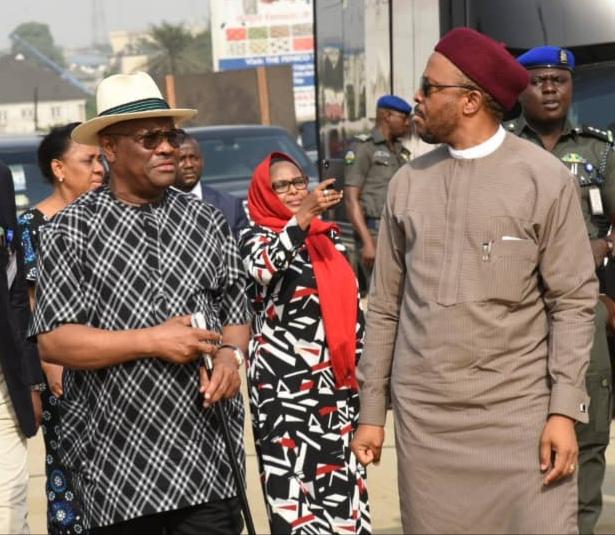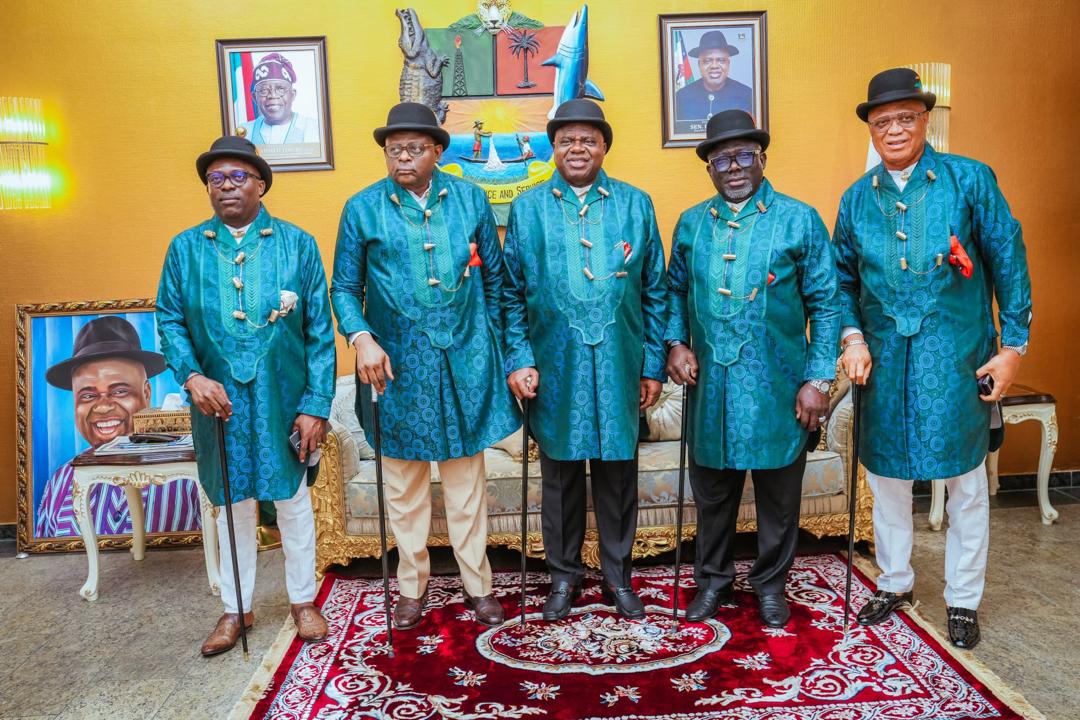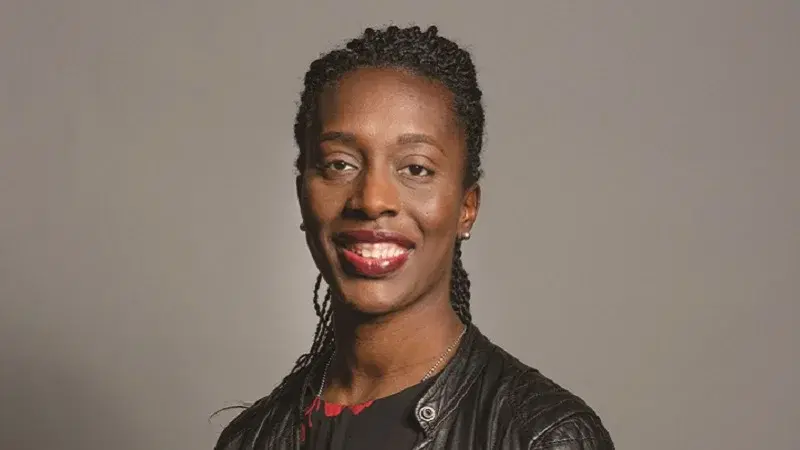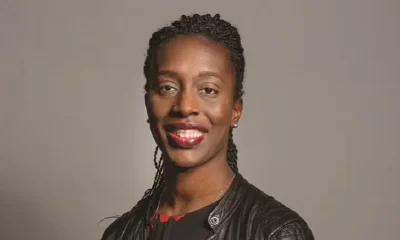News
Wike Has Done Terrific Work In Rivers -FG …Assures Refund Of Monies Spent On Federal Projects By RSG

The Federal Government has assured the Government and people of Rivers State that it would effect a refund of monies expended on federal projects in the state.
Addressing journalists after embarking on the verification of federal road projects executed by the Rivers State Government on behalf of the Federal Government, yesterday, in Port Harcourt, the Minister of State for Education, Hon Chukwuemeka Nwajiuba, said that the President Muhammadu Buhari-led administration would always abide by set rules.
Nwajiuba said: “The Federal Government has always cooperated with the people of Rivers State. Rivers State is the strongest economic base of the country, and anything that the Federal Government will do for the Government and people of Rivers State, the Federal Government will respond accordingly.
“The President is a stickler for the rules. We have addressed this everywhere, except for five states, that we are now verifying. No state has had an issue,” the minister stated.
The minister said that the Rivers State Government, over the years, did a splendid work in the construction of key projects in the state.
“Terrific work has been done by the Government and people of Rivers State on behalf of the Federal Government. The governor has taken us on extensive review of more than six projects that we came to inspect,” he said.
He expressed happiness with the tour of Federal Road Projects executed by the Rivers State Government.
He said: “I am glad we took time out to go and see all of them and verify them physically. We are really sure that the state government has done what is right.”
The Rivers State Governor, Chief Nyesom Wike, had led the Federal Executive Council Verification Team on a tour of listed projects in the state.
In an interview with journalists after the Joint Verification Exercise, the Rivers State Governor, Chief Nyesom Wike said he was confident that the Federal Government would effect a refund.
He said: “The minister has come with his team, and I believe they will refund us the funds expended on the roads.
“We have made submissions for refund, but we are yet to receive any refund from the Federal Government. I believe this last verification will come to fruition. I have confidence that they will refund us the money expended on federal projects.”
Wike said if the Federal Government fails to effect the refund as promised, the Rivers State Government would raise an alarm.
“If they don’t refund, we will raise alarm, and tell the world to help us ask why we are being denied the refund.
“Now, we are talking of governance and we need these funds to do more projects for our people. He has given us assurance that the Federal Government will effect a refund this time around”, Wike added.
The tour commenced at the over 41.26-kilometre dualisation of the Airport-Isiokpo-Elele-Omerelu Road, the reconstruction of Ikwerre Road from Education to Agip flyover junction, construction of flyover at Agip-Rumueme-Abacha roundabout and the construction of flyover on East-West Road at Obiri-Ikwerre with rotary turning and service lanes.
The verification team also visited the construction of Eleme junction flyover and interchange and the construction of phases one and two of Ada-George Road.
Wike also led the team on an inspection of the Rebisi, Rumuogba and Okoro-Nu-Odu flyover bridges under construction by the Rivers State Government at Garrison, Artillery and Rumuokoro junctions in Port Harcourt and Obio/Akpor local government areas, respectively.
Earlier, the Rivers State Governor, Chief Nyesom Wike, had stated that he was hopeful that the Federal Government would refund state resources used to execute federal projects in the state.
Wike said that his optimism stems from the fact that the Federal Executive Council has sent a verification team to the state in respect of federal projects.
He spoke, yesterday, during a courtesy visit by the Minister of State for Education, Hon Chukwuemeka Nwajiuba at the Government House, Port Harcourt, yesterday.
He said: “I thank the Federal Government for at least coming to verify our claims. We submitted our claims, while some other states have been paid. But we are hopeful.
“We have been submitting several documents on the issue of projects that were executed by the Rivers State Government for the Federal Government. We believe that by this verification visit, we will get paid”.
He said most of the federal projects in question were executed by Dr Peter Odili and the immediate past administration of Chibuike Amaechi in the state.
He said that if the state gets the said funds, they would be channelled towards other developmental projects in the state.
Wike said that the country must move together in unity, because certain issues transcend politics.
In his response, the Minister of State for Education, Hon Chukwuemeka Nwajiuba, explained that the team was in the state in respect of the federal projects verification exercise approved by the Federal Executive Council.
He said that the team would assess and verify projects that the Rivers State Government completed on behalf of the Federal Government and report back to the Federal Executive Council.
He noted that the Federal Executive Council raised the committee following official demands by the Rivers State Government on federal projects executed by the state.
The minister said that the verification team would work with the Rivers State Government to verify the claims.
News
Let’s Approach Regional Development Issues Differently – Fubara …As S’South Govs Host Fubara To 50th Birthday Celebration

Rivers State Governor, Sir Siminalayi Fubara, has sued for a change in the current approach adopted by South South Governors in their pursuit to achieve holistic regional development and economic prosperity.
The governor insisted on de-emphasis in vested individuals’ political interests while looking at the bigger picture of achieving enduring regional integration that will strengthen unity of purpose to change the trajectory of development in the region.
Fubara made the appeal during the meeting of Governors of South-South States, under the auspices of BRACED Commission, at the Bayelsa State Government House in Yanagoa on Tuesday.
This was contained in a statement by the Chief Press Secretary to the Governor, Nelson Chukwudi.
BRACED is an acronym for Bayelsa, Rivers, Akwa Ibom, Cross River, Edo and Delta.
He said: “I want to appeal that if we have to succeed in this drive, we need to keep our political differences aside and understand that the struggle, as at today, is for posterity, for the development of our region.
“It is really sad that in Niger Delta that is the economic base of this country, the construction of a road that you tagged ‘East-West Road’ could be an issue, that we need to beg, protest, and complain to get it fixed. I don’t think it is proper.”
Governor Fubara stated that it is not that the federal authorities do not understand that Niger Delta needs the road but quickly added that they have seen that even the people of the region do not take themselves seriously.
The governor said the moment Niger Delta people stopped playing to the gallery, and place value on themselves, outsiders will have no option than to accord the region and its people due regard.
Fubara said: “On my part, I want to say this: This is not the first time we are meeting. For me, I followed the course of the region meeting in a forum that we tagged “BRACED Commission.”
“BRACED Commission is also one of the bodies that was constituted at that time to support and work out development strategies for this region. But what I am seeing today is just limiting this meeting to only BRACED COMMISSION.
“We need to widen the scope where other leaders of the region should be part of the discussion of the development of the region, and I think this is the direction that will help the region.”
Reading the Communique of the meeting, the new Chairman of the Forum of Governors of South-South States, and Governor of Bayelsa State, Senator Douye Diri, said they support the Federal Government Tax Reform Bills, and urged President Bola Tinubu to extend the Value Added Tax (VAT) sharing percentages to oil and gas derivation.
He stated the Forum’s request to the Federal Government to urge relevant stakeholders and agencies to extend remediation of polluted environment ongoing in Ogoni land to other impacted communities and States in the region.
Governor Diri also said that the Forum resolved to establish a structural regional security network to enhance safety and security, foster stable Niger Delta region conducive for economic growth and prosperity.
Highlight of the event was the hosting of Governor Fubara to a surprise 50th Birthday celebration by the Governors of South-South States at the Government House in Yenagoa.
News
Fubara Lauds Tinubu For Setting Up Education Load Fund … Vows To Ensure Rivers Benefit Maximally From Scheme

The Rivers State Government has applauded President Ahmed Bola Tinubu for conceiving the idea of setting up the Nigeria Education Loan Fund (NELFUND) which has opened up opportunities for youths to acquire tertiary education irrespective of their financial status.
Rivers State Governor, Sir Siminalayi Fubara, gave the commendation while playing host to a delegation from NELFUND who came on an advocacy visit to the Government House in Port Harcourt on Tuesday.
Represented by his deputy, Prof. Ngozi Nma Odu, Governor Fubara said in developed countries it is common for people to go through school with loans which they sometimes pay all throughout their lives, noting that “for us, it is more accessible and more friendly because you would be required to pay back the loan two years after your National Youth Service.
“It is a win-win situation; it is a situation where the youths in Nigeria should not say because my parents are poor or passed away I cannot improve on my educational growth. This offers them a golden opportunity and I am glad you came for this advocacy.”
The governor urged NELFUND to intensify its advocacy to let the people know how they can benefit from it, adding that it is more important when talking about vocational institutions.
“If you look at the developed countries it is people that went to the vocational schools that make so much money, because it is pricey to get somebody to do anything, we need to instil this into our people, our youths, because people sometimes tend to look down on people that went to vocational schools, it should not be,” he said.
Fubara expressed delight with the NELFUND programme and assured that the State Government would do whatever it can to ensure Rivers State benefits maximally from the scheme.
In his remarks, the Managing Director and Chief Executive of NELFUND, Dr. Akintunde Sawyer, informed the governor that they were in Rivers State to seek the support of the State Government towards the loan, stressing that President Tinubu has directed them to ensure no Nigerian student who has the ability and desire to get educated at tertiary level is denied the opportunity due to lack of funding.
He explained that the scheme provides interest-free loans to students who apply, adding that these loans are not repayable until two years after their Youth Service when they must have gotten a job.
News
UK Appoints British-Nigerian As Trade Envoy To Nigeria

A British-Nigerian politician, Florence Eshalomi, has been appointed as the United Kingdom’s trade envoy to Nigeria.
Her appointment makes Eshalomi the second Nigerian to hold the position.
Confirming her appointment on X on Tuesday, she wrote: “It is an honour to have been appointed as the United Kingdom’s Trade Envoy to Nigeria.
“I’m looking forward to building on my close ties with Nigeria to promote a strong and flourishing economic relationship between our two great nations.
“I am looking forward to strengthening the UK’s relationship with Nigeria to explore shared growth and opportunities for both countries.”
Announcing the appointment in a statement on Tuesday, Jonathan Reynolds, the UK’s Business and Trade Secretary, said the decision was aimed at attracting investment into the UK and boosting economic growth.
“I’ve launched a new team of trade envoys who will use their experience, expertise, and knowledge to unlock new markets around the world for British businesses, attract investment into the UK, and ultimately drive economic growth,” Reynolds said.
Eshalomi, 44, is an MP representing the Vauxhall and Camberwell Green constituency.
She holds a Bachelor of Arts (Hons) in Political and International Studies with Law from Middlesex University.
-

 News5 days ago
News5 days agoUK Appoints British-Nigerian As Trade Envoy To Nigeria
-

 Business5 days ago
Business5 days agoFG Issues 25-year Licence To 10 Gas Distribution Coys
-
News5 days ago
FG Deports 828 Illegal Immigrants, Tightens Border Security
-
Rivers5 days ago
Holy Ghost Rally, Source Of Blessings-Fubara
-
Niger Delta5 days ago
D’Gov Tasks APWEN, Others On SMART Goals
-
Nation5 days ago
50% Telecom Tariff Hike: NLC Fixes Date For Nationwide Protest
-
Niger Delta5 days ago
Dep Gov Tasks Perm Secs On Collaboration, Productivity
-
Business5 days ago
$1trn Economy: LCCI Advocates More Investments In Telecom Infrastructure





